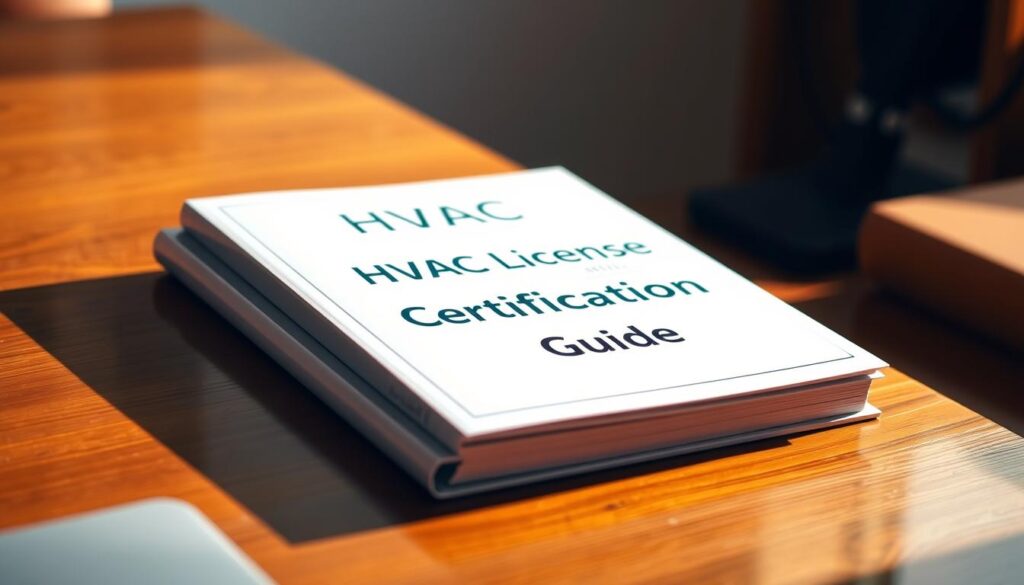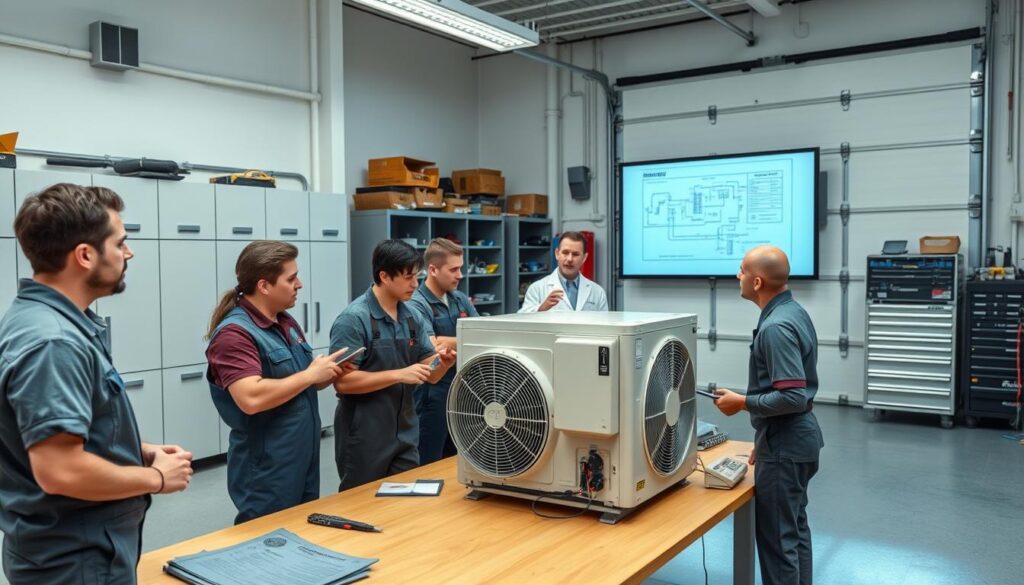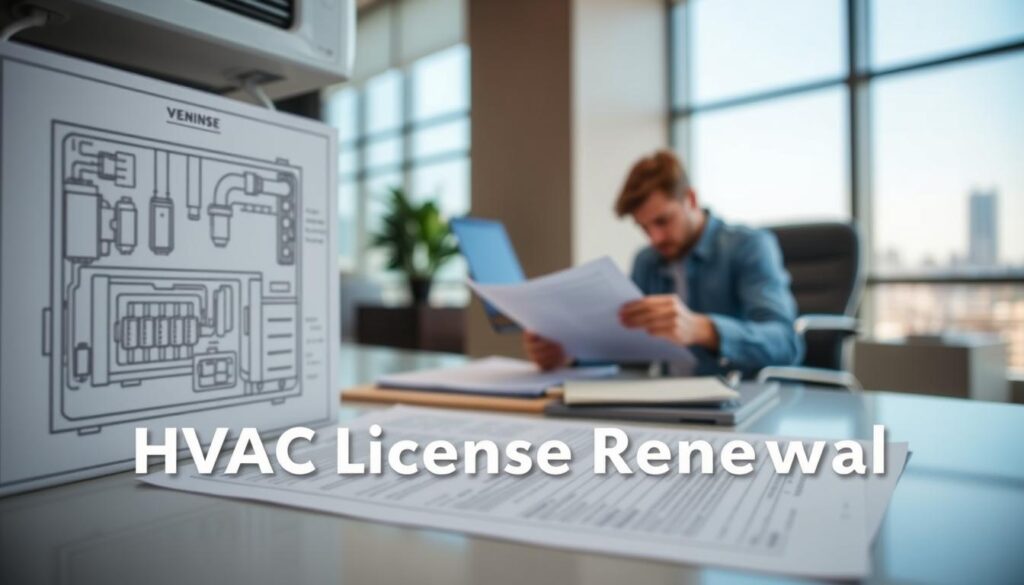Affiliate Disclosure
HVAC Guide Guys is a participant in the Amazon Services LLC Associates Program, an affiliate advertising program designed to provide a means for sites to earn advertising fees by advertising and linking to Amazon.
How to Obtain HVAC License? Are you ready to start a lucrative career in the heating, ventilation, and air conditioning field? Getting an HVAC license could be your key to a stable and rewarding job.

The HVAC certification process is more than just filling out forms. It opens the door to a dynamic field with great earning potential. HVAC technicians can make up to $100,000 a year, making it a great career choice for skilled workers.
This guide will take you through every step to get your HVAC license. You’ll learn about educational needs and state rules. You’ll get the inside scoop to start your successful HVAC career.
Key Takeaways
- HVAC licensing is crucial for legal and professional practice
- Earning potential ranges from $50,000 to $100,000 annually
- Certification requires specific educational and training requirements
- State regulations vary for HVAC licensing
- Professional development is key to career advancement
Table of Contents
Understanding HVAC Licensing Fundamentals
Getting into the HVAC world can seem tough, but knowing the basics is key. It’s important for anyone wanting to succeed in heating, ventilation, and air conditioning. The HVAC field is full of chances for skilled people who get the right training and certification.
When you’re ready to apply for an HVAC contractor license, you need to know about the different licenses and what they require. Each state has its own rules, so it’s vital to check the local laws carefully.
Types of HVAC Licenses
- Apprentice License: This is for beginners starting their HVAC career.
- Journeyman License: It’s for those with some experience.
- Master Technician License: This is for the most experienced professionals.
Basic Licensing Requirements
Most states have a few main requirements for HVAC licenses:
- You must be at least 18 years old.
- You need a high school diploma or something similar.
- You have to finish an approved training program.
- You must pass a state-specific exam.
Industry Overview and Career Prospects
The HVAC industry is growing, offering many job chances in homes, businesses, and factories. Skilled workers can look forward to good pay and job stability. This is because more people want energy-saving ways to control the climate.
Getting the right license is your first step to a great HVAC career.
Explore Our HVAC Shop
Looking for top-rated HVAC tools, parts, and accessories? Visit our shop and find the perfect solution for your needs.
Visit the ShopHow to Obtain HVAC License: Step-by-Step Process
Getting an HVAC license takes careful planning and hard work. It’s a journey that turns your dream into a real career. You’ll go through important steps to become a licensed HVAC technician.
To begin your HVAC certification journey, follow a clear path:
- Complete High School or GED
- Enroll in HVAC Technical Training Program
- Gain Practical Work Experience
- Register for State Licensing Examination
- Pass Required Certification Tests
The time it takes to get an HVAC license is 1-5 years. This depends on your education and local rules. Each state has its own rules, so it’s key to know what they are.
The main parts of getting a license are:
- Getting a good technical education
- Doing an apprenticeship
- Passing state-approved tests
| Stage | Duration | Key Requirements |
|---|---|---|
| Educational Training | 6-24 months | Technical certificate/diploma |
| Apprenticeship | 2-4 years | Supervised practical experience |
| Licensing Examination | 1-2 months | State-specific certification test |
Success in HVAC needs patience, ongoing learning, and mastering technical skills. Stay committed to your journey.
Educational Prerequisites and Training Programs
Starting an HVAC career needs careful planning and the right education. Your path to becoming a licensed HVAC technician begins with the right training and meeting certification requirements.
Professional HVAC training gives you the technical skills and hands-on experience needed. Most programs have detailed curriculums to help you pass the hvac license exam.
Accredited HVAC Schools and Programs
Choosing an accredited school is key for your career growth. Look for programs with:
- Comprehensive classroom instruction
- Hands-on technical training
- Industry-standard equipment exposure
- Certification exam preparation courses
Core Curriculum Components
HVAC training programs focus on key technical skills and theory:
- Electrical systems fundamentals
- Refrigeration principles
- Climate control technologies
- Safety protocols and regulations
Duration and Cost of Training
HVAC programs differ in length and cost. Here’s a look at common training options:
| Program Type | Duration | Estimated Cost |
|---|---|---|
| Certificate Program | 6-12 months | $3,000 – $7,000 |
| Associate Degree | 2 years | $10,000 – $15,000 |
| Apprenticeship | 3-5 years | Varies (often employer-sponsored) |
Invest in your future by choosing a reputable HVAC training program that aligns with your career goals and financial resources.
Explore Our HVAC Shop
Looking for top-rated HVAC tools, parts, and accessories? Visit our shop and find the perfect solution for your needs.
Visit the ShopHVAC Apprenticeship Requirements

Starting a career in HVAC begins with understanding apprenticeships. These programs are key for those aiming to become journeyman HVAC technicians. They mix hands-on experience with classroom learning, offering a well-rounded education.
HVAC apprenticeships last 4-5 years. You’ll learn vital skills from experts. The training includes two main parts:
- Practical on-site training with experienced professionals
- Technical classroom instruction at vocational schools or community colleges
To join an apprenticeship, you must meet certain criteria:
- Be at least 18 years old
- Hold a high school diploma or GED
- Pass basic math and reading assessments
- Complete a physical examination
- Pass a background check
During your apprenticeship, you’ll master skills like system installation, maintenance, troubleshooting, and repair. This training gets you ready for the journeyman HVAC license exam, proving your skills.
Think about the cost. Many programs offer paid training, with pay increasing as you gain experience. This way, you can earn while learning, making it a great entry into HVAC.
State-Specific Licensing Regulations
Getting a hvac contractor license can be tricky. Each state has its own rules for HVAC pros. Knowing these rules is key to getting your license.
States have different ways of licensing HVAC techs. Where you live will tell you what steps and skills you need to get licensed.
Licensing Boards and Authorities
Every state has its own group that watches over HVAC licenses. These groups make sure techs are good enough and keep people safe.
- State-level construction departments
- Professional licensing boards
- Department of labor regulatory agencies
Regional Variations in Requirements
Licensing rules for HVAC can change a lot from place to place. Some main differences include:
- How many hours of work experience you need
- What education you must have
- How hard the exams are
- How often you need to renew your license
Application Procedures
To apply for a hvac contractor license, you’ll need to gather certain documents:
| Document | Purpose |
|---|---|
| Proof of Education | Verify technical training |
| Work Experience Records | Demonstrate practical skills |
| Background Check | Ensure professional integrity |
| Examination Scores | Confirm technical competency |
Pro tip: Always check with your state’s specific licensing board for the most current requirements, as regulations can change periodically.
Certification and Examination Process
Getting your HVAC certification can seem tough, but with good prep, you can pass the exam. This step is key in your HVAC career. It shows you know your stuff.
Start getting ready for your hvac license exam early. Most exams test your knowledge in several areas:
- HVAC system design and installation
- Electrical principles
- Refrigeration fundamentals
- Safety protocols
- Local and national building codes
To ace the exam, you need a solid study plan. Here are some tips:
- Sign up for a detailed exam prep course
- Take practice tests to spot what you need to work on
- Study technical manuals and industry standards
- Join study groups or online forums
Knowing what the exam is like is key. Most have multiple-choice questions and hands-on tests.
| Exam Component | Typical Duration | Passing Score |
|---|---|---|
| Written Exam | 3-4 hours | 70-75% |
| Practical Skills Test | 2-3 hours | 80% |
Pro tip: Sign up for your exam early. Make sure you have all the needed documents ready for a smooth process.
Explore Our HVAC Shop
Looking for top-rated HVAC tools, parts, and accessories? Visit our shop and find the perfect solution for your needs.
Visit the ShopSpecializations and Advanced Certifications
The HVAC industry offers many chances for career growth through special certifications. By getting specific training, you can boost your skills and stand out in the job market.
Commercial HVAC Licensing
A commercial hvac license is a big step for technicians aiming for complex jobs in big buildings. It shows you can handle advanced heating, ventilation, and air conditioning systems in commercial places.
- Requires more technical knowledge than residential systems
- Has tougher exam processes
- Can lead to better pay in industrial and commercial fields
Residential HVAC Certification
Residential HVAC certification is for working on home systems. It makes you a go-to person for home climate control needs.
- Finish specific training programs
- Pass detailed skill tests
- Show you know how to fix residential systems
Refrigeration Specialization
Refrigeration certification is key for those interested in cooling systems beyond HVAC. It opens doors in various fields, like food service and industrial manufacturing.
Those with refrigeration certification can find more job chances and earn well.
The job market in provinces expects about 2,000 HVAC tech jobs from 2023 to 2027. It’s a great time to get advanced certifications.
Getting strategic certifications can change your HVAC career. It makes you a top choice in a changing field.
License Maintenance and Renewal

Keeping your HVAC license up to date is key to your career. The renewal process needs your full attention and proactive steps to meet certification needs.
States often require renewal to keep HVAC pros up with new standards and tech. Renewals usually happen every one to two years, based on your state’s rules.
Key Renewal Requirements
- Complete mandatory continuing education hours
- Submit renewal application before expiration
- Pay required renewal fees
- Maintain current professional credentials
HVAC certification needs proof of ongoing learning. This ensures pros are current with HVAC’s latest tech and safety rules.
Renewal Process Breakdown
| Requirement | Details | Typical Timeframe |
|---|---|---|
| Continuing Education | Technical courses and safety training | 8-16 hours per renewal cycle |
| Application Submission | State board documentation | 30-60 days before expiration |
| Renewal Fees | State-specific licensing costs | $50-$250 |
To avoid losing your license, keep track of renewal dates. Managing your professional credentials well keeps your HVAC career moving forward.
Professional tip: Use a digital reminder for your license renewal to stay on top of your field.
Explore Our HVAC Shop
Looking for top-rated HVAC tools, parts, and accessories? Visit our shop and find the perfect solution for your needs.
Visit the ShopProfessional Development and Career Growth
The HVAC industry is booming, with $15.2 billion in revenue from 2018 to 2023. Skilled technicians can find rewarding careers by growing their expertise. This growth is key for long-term success.
To reach your full potential in HVAC, follow these steps:
- Pursue advanced hvac certification requirements to expand your skill set
- Specialize in commercial hvac license tracks for higher-paying opportunities
- Stay current with emerging technologies and industry innovations
- Develop leadership and management skills
Continuous learning is vital in the fast-changing HVAC field. Technological advancements are quick, so staying updated is crucial. By investing in your growth, you can move into roles like:
- Senior HVAC technician
- System design specialist
- Technical sales representative
- HVAC project manager
Your dedication to learning will shape your future in HVAC. By learning more, getting extra certifications, and using new tech, you can build a successful HVAC career.
Conclusion
Getting an HVAC license is a big step towards a fulfilling career in heating, ventilation, and air conditioning. Your path to getting certified needs careful planning, hard work, and a commitment to meet licensing standards.
Learning how to get an HVAC license involves several steps. You’ll need to finish educational programs and pass state exams. Each step you take you get closer to becoming a skilled HVAC technician, with lots of job opportunities in the U.S.
The rules for HVAC certification might look tough, but they’re in place to ensure top-notch service and skills. By following this guide, you can move through the licensing process, get the training you need, and reach your career goals.
Your hard work in learning HVAC skills will pay off in the long run. The need for skilled HVAC workers keeps growing, offering great chances for those who invest in their education and get certified.
FAQ
How long does it typically take to obtain an HVAC license?
Do I need a high school diploma to become an HVAC technician?
How much does HVAC license training cost?
How long does it typically take to obtain an HVAC license?
Do I need a high school diploma to become an HVAC technician?
How much does HVAC license training cost?
FAQ
How long does it typically take to obtain an HVAC license?
Getting an HVAC license takes 2-5 years. This includes education, apprenticeships, and passing exams. The time can change based on your state’s rules and how fast you train.
Do I need a high school diploma to become an HVAC technician?
Yes, you need a high school diploma or GED to start HVAC training. Some schools might have extra rules for admission.
How much does HVAC license training cost?
HVAC training costs vary from
FAQ
How long does it typically take to obtain an HVAC license?
Getting an HVAC license takes 2-5 years. This includes education, apprenticeships, and passing exams. The time can change based on your state’s rules and how fast you train.
Do I need a high school diploma to become an HVAC technician?
Yes, you need a high school diploma or GED to start HVAC training. Some schools might have extra rules for admission.
How much does HVAC license training cost?
HVAC training costs vary from $1,200 to $15,000. Community college programs are usually cheaper, between $3,000 and $10,000. Apprenticeships are often less expensive, with on-the-job learning.
What are the age requirements for obtaining an HVAC license?
You must be at least 18 to get an HVAC license. Some apprenticeships start at 16 with parental consent or school programs.
Do I need to pass an exam to get an HVAC license?
Yes, you need to pass a licensing exam. It tests your HVAC knowledge, electrical skills, and local codes. The exam has written and practical parts.
How often do I need to renew my HVAC license?
HVAC licenses need renewal every 2-3 years. Renewal involves continuing education and a fee to show you’re still skilled.
Can I obtain an HVAC license online?
You can do some online education, but most HVAC training is hands-on. Online programs help, but can’t replace practical training and exams.
What specializations are available in the HVAC field?
HVAC techs can specialize in many areas. These include commercial systems, residential work, refrigeration, and more. Each area might need extra certifications.
How much can I earn as a licensed HVAC technician?
HVAC techs earn $48,000 to $75,000 a year. Your salary depends on location, experience, and specializations. More skills mean more money.
What are the physical requirements for becoming an HVAC technician?
HVAC techs need to be physically fit. They should be able to lift 50 pounds, work in tight spaces, and climb ladders. Good physical health is key for this job.
,200 to ,000. Community college programs are usually cheaper, between ,000 and ,000. Apprenticeships are often less expensive, with on-the-job learning.
What are the age requirements for obtaining an HVAC license?
You must be at least 18 to get an HVAC license. Some apprenticeships start at 16 with parental consent or school programs.
Do I need to pass an exam to get an HVAC license?
Yes, you need to pass a licensing exam. It tests your HVAC knowledge, electrical skills, and local codes. The exam has written and practical parts.
How often do I need to renew my HVAC license?
HVAC licenses need renewal every 2-3 years. Renewal involves continuing education and a fee to show you’re still skilled.
Can I obtain an HVAC license online?
You can do some online education, but most HVAC training is hands-on. Online programs help, but can’t replace practical training and exams.
What specializations are available in the HVAC field?
HVAC techs can specialize in many areas. These include commercial systems, residential work, refrigeration, and more. Each area might need extra certifications.
How much can I earn as a licensed HVAC technician?
HVAC techs earn ,000 to ,000 a year. Your salary depends on location, experience, and specializations. More skills mean more money.
What are the physical requirements for becoming an HVAC technician?
HVAC techs need to be physically fit. They should be able to lift 50 pounds, work in tight spaces, and climb ladders. Good physical health is key for this job.

